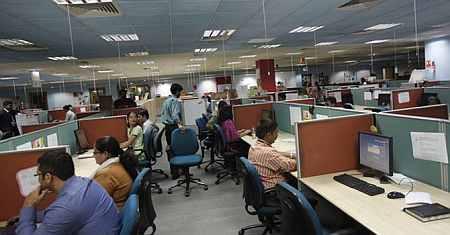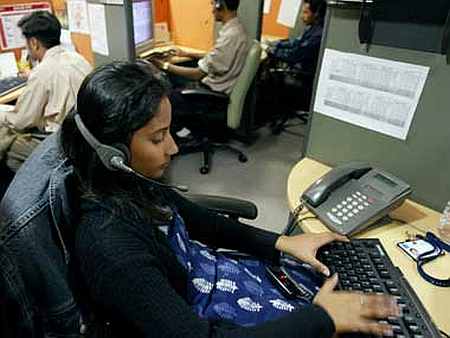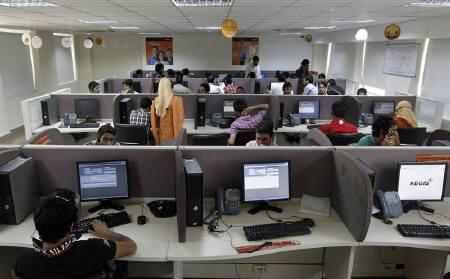 | « Back to article | Print this article |
How the Philippiness outplayed India in the outsourcing game
The rambling, low-slung vastness of Metro Manila, the National Capital Region of the Philippines, is broken by the steel and glass high-rises of Makati -- the country's financial nerve centre.
At one end of Ayala Avenue, the main thoroughfare of this central business district, sits Bong Borja, in a roomy corner office.
The story of the Philippine business process outsourcing (BPO) sector is well known, but Borja reveals another facet of this extraordinary tale: how the Philippines learnt to play the outsourcing game from India.
Click NEXT to read more...
How the Philippiness outplayed India in the outsourcing game
It is a tale of consequence because the Philippines has since outplayed the Indians at their own game, and is now the biggest exporter of the voice-based BPO services in the world.
"A lot of our success was because we were operating with India, in hindsight. We were learning from them, taking the best practices but also avoiding the pitfalls. We knew, for example, early on that wage inflation was creeping up and so when we were faced with the same issue, we were steadfast as an industry to not go into that trap," he says, with a hint of an accent.
Borja can speak of the industry with some authority — he was among the Filipino entrepreneurs who got the country's BPO industry off the ground at the turn of the century.
Click NEXT to read more...
How the Philippiness outplayed India in the outsourcing game
By 2004, PeopleSupport, the company that he founded, was listed on the NASDAQ, and had expanded in the Philippines and even to Costa Rica.
Four years later, it was acquired by the Essar Group and became part of Aegis, of which he is now president - strategic initiatives.
"But we learnt good things as well. (For instance) the expansion geographically into other provinces of India, and not just focusing on the main ones in India. We knew that we had to go near where the talent is," he adds.
Click NEXT to read more...
How the Philippiness outplayed India in the outsourcing game
Along the way, Borja played a pivotal role in setting the Business Processing Association of the Philippines (BPAP), equivalent to India's National Association of Software and Services Companies (Nasscom), and the Contact Center Association of the Philippines. He has chaired both bodies, once even concurrently.
"We were trying to forge a very strong partnership between Nasscom and BPAP in promoting offshoring," Borja recalls, though he stutters a little while trying to get former Nasscom president Kiran Karnik's first name right.
Click NEXT to read more...
How the Philippiness outplayed India in the outsourcing game
The partnership has persisted, insists Gillian Joyce Virata, senior executive director of BPAP.
"We always look at India to see what's happening, what you've done right, what we should watch out for, if there are any pitfalls and since India started ahead of us, naturally as a leader, we watch you all the time," she says, "It's nothing to be paranoid about. We do work well with Nasscom."
In fact, according to Virata, the Philippine government looked at Nasscom as a template while setting up BPAP in 2004.
Click NEXT to read more...
How the Philippiness outplayed India in the outsourcing game
"India actually made outsourcing a comfortable and viable proposition to the western world, and so the barrier to offshoring, by the time we came in, was less. They (the client) could only say that since we've outsourced to India, we can also outsource to the Philippines," adds Borja, "So, we did feed off the success of India."
There are the usual reasons why the BPO sector has seen strong growth in the Philippines: a substantial English-speaking population, with about 500,000 graduates coming into the job market every year; labour cost arbitrage, as wages remain much lower than other large English-speaking countries; and a cultural affinity to Western countries, particularly the United States, the largest outsourcing client in the world.
Click NEXT to read more...
How the Philippiness outplayed India in the outsourcing game
However, there are other factors that have helped create favourable conditions -- and some of these have a distinctly Indian flavour.
"A lot of the fiscal incentives that we've got right now have been patterned after India and a couple of other countries. The income tax holidays and things like that," says Borja.
For companies that register with the Philippine Economic Zone Authority, there's an income tax holiday for up to eight years, followed by 5 per cent tax on gross income, compared to 35 per cent for other corporate entities in the Philippines.
Click NEXT to read more...
How the Philippiness outplayed India in the outsourcing game
Alongside, there's a complete waiver on value-added tax for any purchases, as well as no tax or duty on imports.
Kiran Karnik, former president of Nasscom, recalls his erstwhile organisation's support for the then fledgling Philippine BPO sector.
"There are many things that they picked up from us," he admits, when asked about the fiscal incentives, "And they bettered us on that, while our government has stepped back and there are differences on the tax and regulatory front now."
Click NEXT to read more...
How the Philippiness outplayed India in the outsourcing game
Industry bodies like BPAP did much more than merely take the Indian paradigm and replicate it in the archipelago.
"One of the biggest tweaks that was done was extending the economic zones to buildings," says Borja.
While the original law looked at developed repressed areas or empty US military bases, the industry lobbied hard to get these extended to buildings as infrastructure in the prescribed locations wasn't ready and there wasn't enough human resource available.
Click NEXT to read more...
How the Philippiness outplayed India in the outsourcing game
"That helped tremendously, because I think today the ratio of companies that are operating with economic zone status but not physically in the economic zones would probably be over 90 per cent. It's a major, major thing," he adds.
As a result, while much of India's IT & ITes sector works out of distant software parks, the booming Philippine BPO sector delights in the comforts of vibrant and well-connected business districts in the heart of its cities.
Yet, the country has had its own ghost to fight on the way to the top.
Click NEXT to read more...
How the Philippiness outplayed India in the outsourcing game
"We did have a law that said that women could not work at night, and government was supportive in that it would allow companies with women working in night-shifts to apply for waivers," discloses Virata.
"We only amended the law only last year, I think. All this time, companies have been filing for exemptions from the law. But the government has been open-minded enough to realise that the law really needed to be amended," she adds, with a smile.
Without its women, it would be next to impossible for the Philippines to grow the industry to 25 billion by 2016, with 1.3 million employees. But even with them, it is unlikely to be an easy target to achieve.











